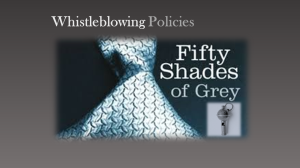On the 2nd and 3rd of Sept 2015, I attended The International Behavioural Insights Conference in London. Hosted by the UK government’s ‘Nudge Unit’ (Behavioural Insights Team), the event included world renowned speakers such as Steve Pinker, Dan Ariely, Max Bazerman, Richard Thaler and Daniel Kahneman.
I attended because in my experience, both as a whistleblower and as one who works in the whistleblowing arena, that to deal with whistleblowing only on the level of legislature and process or within the halls of academia, is superficial. My advocacy has evolved to believe that we need to investigate what it is in the deep structure of the human mind that either drives whistleblowing, or hinders it, and to leverage that research for our understanding of current whistleblowing issues.
To set the tone, Professor Richard Thaler, author of Misbehaving http://www.theguardian.com/books/2015/jul/04/misbehaving-making-behavioural-economics-richard-h-thaler-review-nudge was asked to talk about the BIG problems within our societies, and I was not surprised to see right at the top of his list was CORRUPTION, followed by TAX COMPLIANCE, TERRORISM, CLIMATE CHANGE and END OF LIFE HEALTH CARE. Watch 2min video of Professor Thaler making this salient https://vimeo.com/139731472
Crucially, he identified that the root of all of the big problems lies behaviour, both as an initiator, and as mitigator, with trust being critical to harness lasting change.
With corruption identified at the front and centre of social ills, I was particularly interested in exploring and understanding if the social scientists consideredwhistleblowing as a mitigating behaviour to corruption. Historically I had shared my own whistle-blower experience with Dan Airely http://danariely.com/ with the aim of understanding what lessons could be learned from a behavioural framework. Once again, my desire to understand drove the question I put forward to Dan on Whistleblowing – Watch the 3 min video https://vimeo.com/139695282
Whilst there is much to talk to within Dan’s three minute response I’m going to focus on three areas:
- Employee Loyalty and Whistleblowing
- Altruistic cheating
- Whistleblowing legislation – 50 Shades of Grey
I’d like to begin with the last thing Dan imparts in the video: ‘How do we create loyalty plus something that says there is a higher order?’
Most whistle-blowers, including myself, tell stories of shock and betrayal when we discover we are vociferously condemned as disloyal to our group and organisation, leaving us with feelings of shame and guilt. We all recognise that “Keeping one’s promises,” and honoring agreements are among the highest values we are taught to observe. But how does it come about that individuals in organisations in some circumstances act as if those values are actually absolute, overriding other considerations that would appear to an observer to be extremely compelling?
Humans are herd animals. The threat of expulsion from a group on which our well-being and self-concept depends, often keeps us from participating in (or helping to conceal) behaviour we would abhor in the absence of that threat. Furthermore we have degrees of irrational acceptance to some unethical behaviour. Read my blog here: https://wendy337.wordpress.com/2015/09/21/who-do-you-love-wrongdoers-or-whistleblowers/ . This socialisation in the practice of keeping an organisation’s secrets gradually blinds us to moral ambiguities or conflicts. The consequence is that we may become less and less mindful with what is being demanded, as loyalty to the institution becomes implicitly superior to any other loyalty or obligation, and which overrides altogether the interests of outsiders. History is replete with examples where institutional secrets are kept which have greatly prejudiced the welfare and safety of others.
Whistleblowing in business is often framed as ‘bad’ because it appears, incorrectly, that we are blowing the whistle on our team. This is incorrect. Individuals blow the whistle on a particular practice that is immoral and illegal.
Because companies have been able to get its employees to view it as a team, as in a sports team that we all belong to, it is easier to demand loyalty. Then the rules governing teamwork and team loyalty apply. But businesses are not games. Victory in sports, within the rules enforced by a referee (whistle-blower) is a socially developed convention-taking place within a larger social context that is different from competition in business. One can lose at sport with few consequences. Losing at business has much bigger consequences which permeate into society.
I believe that whistleblowing is not only permissible but ought to be expected when a company is harming society. The issue is not one of disloyalty to the company but of whether the whistle-blower has an obligation to society if blowing the whistle brings them victimisation and retaliation.
I advocate reframing whistleblowing as an act of a Good Samaritan. Would you condemn a Samaritan interfering in the prevention of a suicide? Probably not. Furthermore there would be no need to justify such interference. The same applies to whistleblowing.
Neatly stitched to Employee Loyalty is Altruistic Cheating, to which we are all vulnerable:
When people’s dishonesty benefits others, the others are more likely to view dishonesty as morally acceptable and therefore feel less guilty about benefiting from the cheating.
‘We find that every time there’s a grey zone, people abuse that grey zone. But every time we create this we create a danger” Dan Ariely
The same applies to organisations and governments initiating legislation, both of whom have challenges of how flexible their rules should be. This applies to Whistleblowing in addition to codes of conduct and fiduciary responsibilities – the range of grey zones within them allows misbehaviour.
We often do not like very clear- cut rules because we can rationalise, reason and find the exceptions. However, as Steve Pinker has said, ‘We are not just brains on sticks’. Whilst we understand that we cannot create a good rule, good rules really help us. Watch 2min https://vimeo.com/139959427
Synchronising Whistleblowing legislation and process with behavioural training for Courageous Conversations will help us to figure out for ourselves what is good in a pro socially effective way. See here for more:
https://speakout-speakup.org/#/training






Leave A Comment